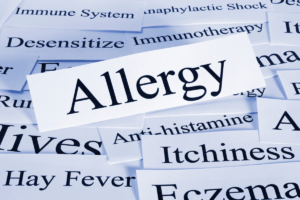
Spring brings flowers and warmer temps but it can be a difficult time if you are an allergy sufferer. Seasonal allergies flare up when there’s a lot of pollen in the air causing allergic rhinitis, also known as hay fever.
Allergy season or pollen season as many refer to … applies to many different plants that pollinate at different many times during the year. Tree pollens in spring, Grass pollens in summer and Weed pollens in fall.
Some suffer from March through the first hard frost in November making for a long year of combating issues. Main symptoms itching, sneezing, congestion, post-nasal drip, headaches, itchy-eyes, fatigue … and some because of reactive airways … coughing and then for some asthma flare-ups.
Medicines and other therapies all help, but the single best things you can do is to avoid your allergy trigger.
Maya R. Jerath, MD, PhD
The best way to control allergies without medication is to avoid them altogether, but that’s not always possible, or realistic. Most of us enjoy being outdoors, going for walks and just enjoying the spring air following the winter season. Given many of us are unwilling to commit to a life indoors, plastic flowers and fake grass in our yards … there are ways you can help alleviate your allergy symptoms.
Here are some helpful tips:
- Keep windows closed
Keep windows and doors closed and turn on the A/C if needed, especially when the pollen count is high. Stay indoors on dry, windy days and avoid outdoor activity in the morning when pollen counts are typically highest. And not just in your home but also in your car when out driving. - Rinse your sinuses
A nasal rinse clears mucus from your nose and can ease allergy symptoms. Not only can it reduce nasal drip, but it can also wash out any irritants or allergies you’ve inhaled. *And if you find you have similar issues for your eyes…you can do an eye rinse with a specially formulated solutions that is soothing to the eye and helps wash the pollen and other irritants from your eyes. - Try Over-the-Counter Remedies
Over the counter medicine can help ease symptoms. Oral antihistamines help with sneezing, itching and stuffy/runny noses. Nasal sprays are another option for itchy, sneezy and runny noses and work particularly well for congestion – but they only work if you use them every day and work best if started before exposure to allergies. Dr. Jerath recommends starting on Valentine’s Day if you have tree pollen allergies so it has a chance up in your system before the pollen comes out in early March. And if you only have tree allergies you can just use it through the end of April and then you can stop until the next Valentine’s Day. However during the season it must be used every day. Oral decongestants offer temporary relief for nasal stuffiness but also raise your blood pressure so should be used sparingly. You should speak with your allergist, primary care doctor or pharmacist about which OTC medicine will be best for you. - Clean up
If you’ve been participating in outdoor activities, you’ll want to be sure to remove your outer layers and shoes before entering your home so as to limit what your track inside. Once inside, shower or bathe to remove as much pollen and as possible to minimize ongoing exposure. This may seem excessive, however if it helps lessen your allergy symptoms, it will be worth the added effort. - Use HEPA air filters & purifiers
A high-efficiency particulate air (HEPA) filter is a mechanical filter that works by forcing air through a fine mesh that traps harmful particles like pollen, pet dander, dust mites and tobacco smoke. Consider purchasing a HEPA air purifier to keep in your bedroom, home office and other places where you spend most of your time. - Allergy Shots
Allergy shots are a way to address the root cause of the allergy. They retrain your immune system not to be allergic anymore. They make a personalized vaccine of what you’re allergic to and then give it to you in a series of shots each time increasing the dose teaching your immune system to not react to the allergens. The goal is to be cured of the allergies at the end of the treatment. - Wear a mask
Since COVID mask-wearing has become every day for many people, and with good reason. Not only does it help protect others from your cold or flu symptoms, it can also help protect you from pollen and other allergens. - Eat Healthy
Add some fresh fruit and veggies to your meals to help boost antioxidants and vitamin C levels and reduce inflammation. - Stay hydrated
Water, sugar-free drinks and other nonalcoholic beverages can thin mucus in your nasal passages and help you find relief. Antihistamines can be very drying so it’s important to remember to stay hydrated. Warm teas, broth and soup also provide a bit of helpful steam. - Think about your pet(s)
If you have pets…wipe their fur, feet and such when you bring them in after letting them outside as they can bring pollen that clings to them into your home, furniture, bedding and such.
And speaking of pets … another allergy that is important to share is that people can become allergic to pets, dust mites and mold. They’re not seasonal and present year round challenges, but CAN also make seasonal allergies worse.

“I like to think of symptoms as filling up a bucket. If your bucket is already ½ full with your cat allergy then adding in the tree pollen allergy in the spring makes it easy for the bucket to overflow and for you to manifest symptoms.
Maya R. Jerath, MD, PhD
If you can limit of clear up your chronic exposures … and bring your bucket down to zero … than the pollen may only fill it up halfway and you won’t be bothered by it nearly as much.”
Clinical Director for Division of Allergy & Immunology, Vice-Chair of Ambulatory Clinical Operations, Safety & Quality